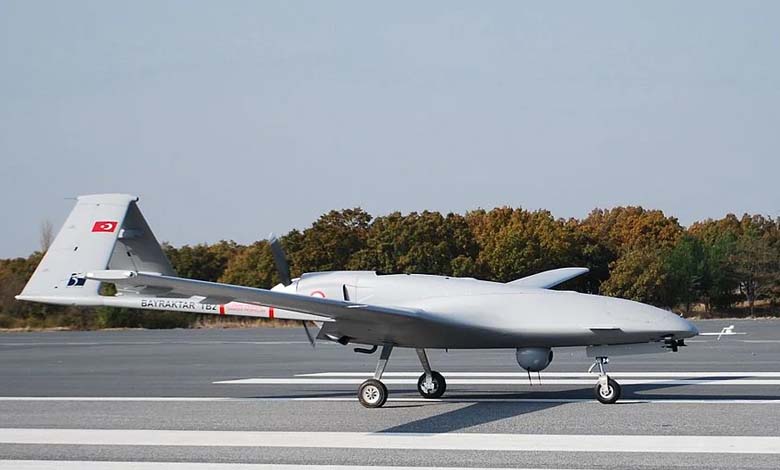Turkish drones in Sudan: when weapons fail and intentions are exposed

Nothing unmasks propaganda like the battlefield. That’s exactly what happened with Turkish drones deployed in the Sudanese conflict. They entered the war with promises of decisive action, only to leave in humiliating failure. The Bayraktar Akıncı, proudly promoted by Ankara in its military campaigns, failed to penetrate airspace controlled by the Rapid Support Forces. It was later replaced by kamikaze drones of the Yiha type, whose fate was no better—they were all shot down before causing any meaningful damage.
-
Turkish Bayraktar Drones: Deepening the Conflict and Worsening the Wounds in Sudan
-
Al-Burhan’s Visit to Turkey: Could It Bring Islamists Back into Sudan’s Political Scene?
But this story is not just about a failed piece of equipment. It highlights the deeper limits of Turkish foreign policy, its real influence in Africa, and its strategic miscalculations. The irony is that the drones didn’t just fail to hit their targets—they revealed Ankara’s underlying ambitions more clearly than any military action could.
Exporting weapons… and an ideological model
In recent years, Turkey hasn’t only been exporting drones—it has been promoting a broader political model: an alliance between the military and Islamist movements, backed by strong media and diplomatic apparatuses. What’s unfolding in Sudan today is a distorted version of that model. Ankara supports the army, but at the same time maintains ties with Islamist factions in Port Sudan that are seeking to reposition themselves within the state’s power structure.
-
Sudanese rapprochement with Iran and Turkey: Economic gains or geopolitical threats?
-
Drones and War in Sudan: A New Strike on “Merowe” Plunges the Region into Darkness
-
Turkish Presence in Sudan: Military Support Increases Civilian Suffering and Destroys Infrastructure
What’s most ironic is that this support is being presented as “a contribution to stability.” In reality, Turkey’s involvement—like that of other foreign players—is making the conflict more complex, prolonging the war, and empowering groups that have long proven incapable of state-building.
Technical failure with political consequences
The failure of the Yiha kamikaze drones, designed to strike radar systems and air defenses, is not just an embarrassment for the manufacturers—it throws Ankara’s military and political calculations into disarray. Turkey had hoped these drones would reinforce the army’s position on the ground and bolster its image as a reliable defense supplier, particularly in Africa. Now, mockery of the Bayraktar drones has become commonplace in Sudan, and this reputational damage could extend to other countries once interested in purchasing these systems.
-
“Bayraktar TB2”: The Turkish “Demon” in the Sky
-
Turkey’s Influence on Sudan’s Islamists Increases the Chances of Success for Its Peace Initiative
-
Turkey Supplies Drones and Weapons to Sudanese Army, Used to Kill Civilians and Displace Them
More importantly, this failure weakens Turkey’s influence over military and political decisions in Khartoum and may prompt the Sudanese army to rethink its regional alliances—especially as international pressure grows on those fueling war instead of pursuing dialogue.
Sudan is not a testing ground
It would be a mistake to see Sudan as a mere arena for testing new weapons. The country has a deeply rooted political and social identity, as well as a long history of failed foreign interventions. What Turkey is attempting today—arming the Sudanese army and promoting its drone technology—is a replay of the same strategic errors made by others who believed a few airstrikes could tip the balance of power. They forgot that war in Sudan cannot be won from the sky.
-
The Sudanese Crisis: How Does Turkey’s Role Affect Potential Solutions?
-
The Sudanese Crisis Grows More Complex: How Is Turkey Shaping the Scene?
Time for a reassessment
The failure of Turkish drones in Sudan should not be seen as just a technical issue, but as a sign of the failure of an entire interventionist strategy. It is time for Ankara to reassess its bets, let go of the illusion of dominance through Islamists and military force, and realize that Sudan’s stability cannot be bought with drones—it must come from a genuine, internal Sudanese political will.
-
Are the Muslim Brotherhood Regaining Influence in Sudanese Trade Unions?
-
The Two-Government Scenario Raises Fears of Sudan’s Partition
-
Is Sudan Moving Closer to Designating the Muslim Brotherhood as a Terrorist Group?
-
Power and Influence Struggles: Infighting Rocks Sudanese Army Alliances
-
Angry March in London Denounces Use of Chemical Weapons in Sudan
-
Political Blackmail and Islamist Dominance over the Sudanese Army: No to War, Yes to Revolution
-
The Lies and Betrayal of the Kizan Against the Sudanese People: When War Becomes a Tool for Extortion and Power












